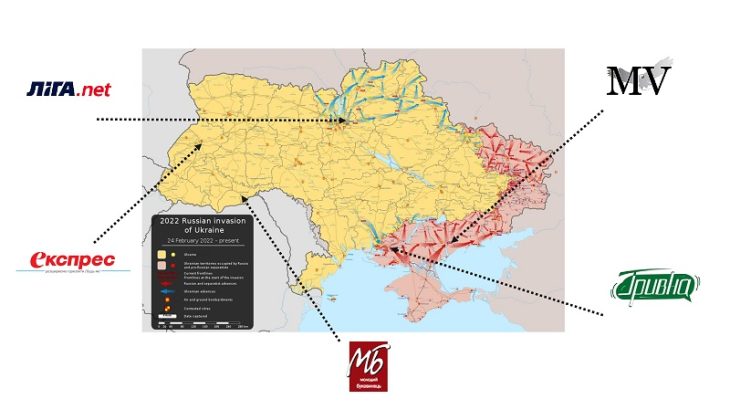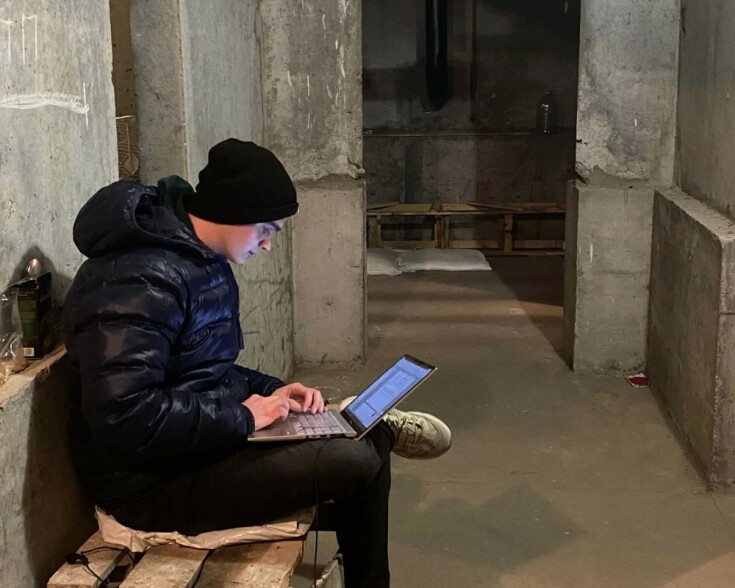As the war grinds on, independent media in Ukrainian-held territory continue to provide vital news and information to audiences. However, those in regions that have been occupied by Russian invaders have been forced to close as they resist calls to publish propaganda, despite journalists, managers and owners facing the threat of kidnap and arrest.
MDIF works with media from across the country, from Melitopol to Lviv. Their experiences give an insight into what life has been like for independent media struggling to survive since the full-scale invasion on 24 February.

Russian invaders silence local voices
Grivna, a newspaper publisher in the southern city of Kherson, was occupied by Russian forces in the very first days of the war and its printing house taken over by invaders in early May. Since occupation of the newspaper’s facilities, the Russians have brought in their own staff and started printing a propaganda newspaper.
About half of Grivna’s staff and management managed to leave Kherson and set up a new website, grivna.ua, to report on life in the city, using reporters inside and outside of occupied territory. The site’s focus is on highlighting resistance initiatives, debunking fake news, keeping people in Kherson informed of how the rest of Ukraine lives and, importantly, keeping people in the rest of Ukraine informed about life in the occupied city.
The situation in the region remains very difficult, with no jobs available that don’t involve working for the occupiers as local businesses have been forced to register with the authorities and comply with new rules.
Media have been completely taken over by the Russians and blanket propaganda transmitted via TV, radio and print. Internet and mobile communications have been switched to Russian providers. Occupying authorities have also started to introduce the rouble as local currency and local Ukrainian banks have started to be replaced by Russian ones.
Melitopolskiye Vedomosti (MV), a newspaper in the southern occupied city of Melitopol, has suffered a similar fate to Grivna, with all editorial activities on hold since the early days of the war and Russians seizing its printing house.
Fortunately, MV’s printing equipment was out of order when the premises were taken over and the occupiers haven’t yet been able to put it to work. About half of MV staff has managed to leave Melitopol.
Despite threats and kidnappings, MV has steadfastly refused to publish pro-Russian propaganda. However, after MV was forced to stop publishing the newspaper, the occupiers published several fake, propaganda-filled editions of a newspaper that was almost identical to MV in an attempt to deceive local residents. Using the MV logo and a similar design, the fake papers have featured portraits of the self-proclaimed pro-Russian mayor, photographs of Russian President Vladimir Putin and reports that the goal of the “special operation” is to liberate the people of Ukraine from Kyiv’s genocidal regime.
As in Kherson, in addition to introducing the rouble as currency, the occupiers have switched all mobile and internet equipment to Russian providers, with internet access now very limited.
Media provide vital news but face financial pressures
The Kyiv-based digital news site Liga.net – the most-trusted news source in the country – continues to provide coverage of the war and other national news in Ukrainian and Russian, It has also launched a weekly newsletter in English to keep international audiences up to date with news on the war, economy, businesses and politics.
In addition to the obvious challenges of covering the war, including journalists reporting from the frontline and Kyiv staff having to work from underground bunkers when the city is under attack, like other media companies Liga suffered a near-total collapse of regular revenues as the advertising market dried up when the country was invaded.
However, the company responded quickly, securing emergency grant funding and launching a successful crowdsourcing campaign. Liga’s current priority is to develop a long-term strategy to bring the company back to sustainability. With the advertising market still sharply down, the company is working on developing new business models and revising old ones.
Molodoy Bukovinets (MB), a local news outlet in Chernivtsi in the west of the country, provides general coverage of the war, with particular focus on how it impacts the region. Due to its location near the Romanian border, much of MB’s coverage is devoted to issues important for refugees, such as medical services, education and shared experiences of people fleeing the conflict. MB also allocates a considerable part of its advertising space to free ads for charitable services for refugees.
Express, based in Lviv, publishes a daily newspaper distributed to the whole of Western Ukraine, as well as an online news site. It continues to provide in-depth coverage of the war, including its implications for political and economic life, although as the conflict grinds on the focus of its coverage is widening. The Ukrayina.pl website, which Express launched in cooperation with Agora, an MDIF client in Poland, to provide practical information and news to Ukrainian refugees in Poland, is the most visited Ukrainian-language website in Poland. In May, there were 4 million visits to the website, compared to 1.1 million in April and 81,000 in March when the website was launched.
At the start of the war, MDIF launched an emergency cash fund to which several of our partners generously contributed, supporting the urgent needs of our current and former Ukraine clients. The fund provides emergency funding for operating costs, as well as helping to source and import equipment that is in short supply locally, such as newsprint and protective equipment for journalists.
